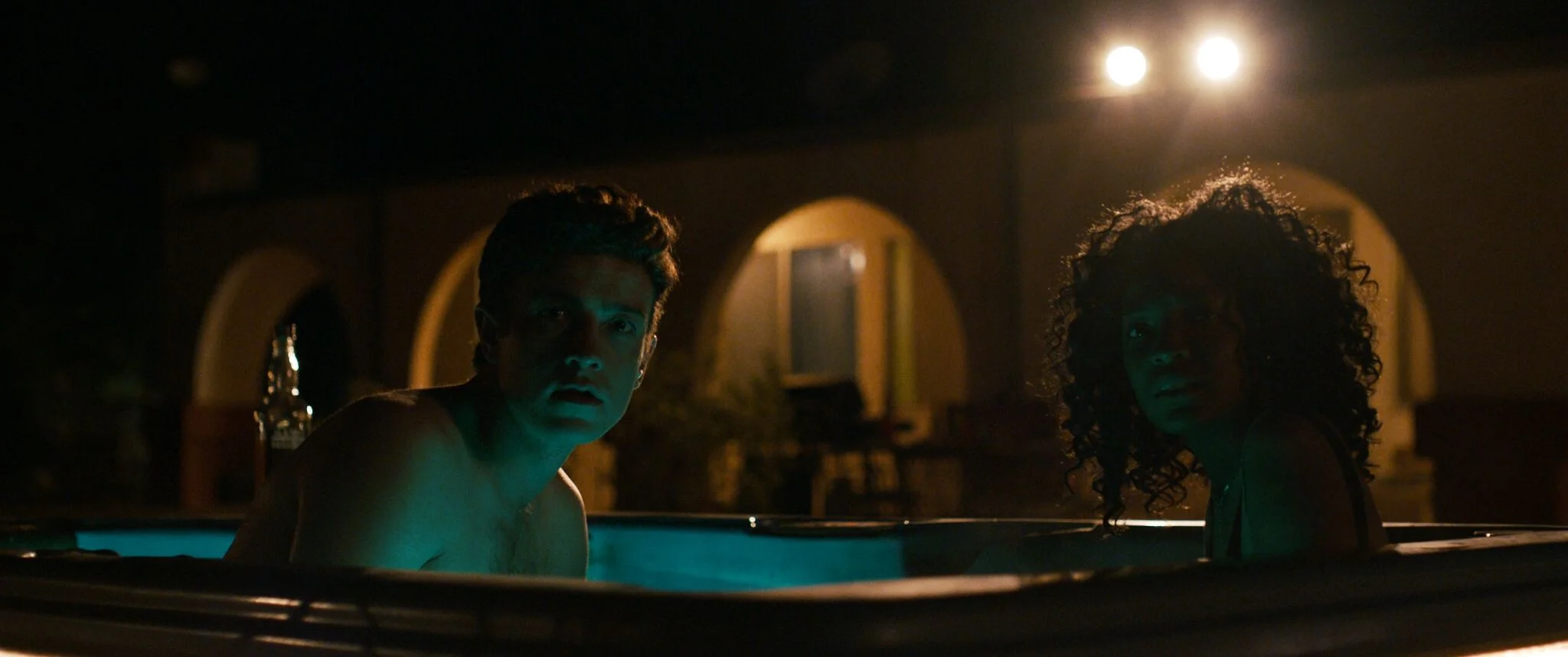[What the Fest?! Review] Depraved
Last weekend, Larry Fessenden’s latest film had its world premiere at NYC’s What the Fest?! A meditative reimagining of Mary Shelley’s Frankenstein, Depraved, which was shot on the 200th(!) anniversary of the book, brings the narrative to the 21st century in some bold ways. I’d always wondered how a filmmaker would tackle a modern retelling of this classic story and make it believable. But Fessenden succeeds, mostly by incorporating modern day fears and keeping the focus squarely on the characters.
In a cold open, we’re briefly introduced to Alex (Owen Campbell) and Lucy (Chloë Levine) who are having a post-coitus argument about their futures. Lucy had made an off-handed comment about how Alex would make a great father and Alex takes Lucy’s compliment to mean she wants to have kids. Right away, the themes of fatherhood is immediately established as Alex lashes out in anger. He’s not ready to be a father, even though Lucy says that’s not what she meant.
“We got tomorrow,” Alex wryly says, after they kind of make up. But that ends up being the last thing they say to each other because Alex is shortly stabbed quite viciously to death on the way home, an apology text almost sent.
Alex wakes up on an operating table in a warehouse/loft; except it’s not quite him. It’s a different person. Or persons. Stitches hold parts of his body together. He’s bald from brain surgery. As the man stares blankly at his face in a mirror, Henry (David Call) enters the room, in awe that his creation has awakened. Henry names him Adam (Alex Breaux) and almost introduces himself as his father but trails off.
He then sets off to reprogram Adam, who has the mental and physical capacity of a newborn. Time passes. Henry teaches him basic logic and visual puzzles. Works on his motor capabilities via playing ping-pong. Synapses fire in his brain. He starts talking. His hair starts to grow back and the scars start to lessen.
Except the reason Adam was created isn’t exactly altruistic. Henry’s colleague Polidori (Joshua Leonard) has been funding the research in hopes of selling a new drug to pharmaceutical companies. Polidori (a nice homage to author and friend of Mary Shelley, John William Polidori) is hedonistic and Fessenden uses him almost as the id of Adam’s development, as he takes him on a whirlwind tour of NYC, with stops at The Met and a strip club.
Then there’s Henry’s on-and-off-again girlfriend Liz (Ana Kayne), who works as a therapist at the VRA and ultimately becomes concerned with Adam’s emotional state. Unfortunately, as anyone familiar with the text knows, things don’t go as plan when man tries to play god. Adam keeps having dreams and flashes of his life as Alex. And of Lucy. The roles of monster and man flip; you know the story.
But what Fessenden does best is focus on the intense character work. Depraved is at its best when it focuses on the relationship between Henry and Adam. Fessenden smartly recontextualizes Henry as a veteran who served as a combat medic, performing triage in the Middle East. Henry saw his friends and fellow soldiers maimed and killed and he couldn’t help them. The problem is, as Liz tells him at one point, “you brought the war home with you.” David Call is fantastic as Henry and brings empathy to a role that is often callous and concerned more with the scientific implications than the moral ones.
Unlike most adaptations, Depraved is almost entirely seen through Adam’s eyes and Alex Breaux performance is fantastic. His lithe and toned body, accentuated by the makeup design by Peter Gerner and Brian Spears imbues this version of the creature as a waif, held together by mere thread. His perspective is further strengthened by cinematographer James Siewert, who incorporates exploding synapses and colorful images to show his progression.
While it’s easy to see Mary Shelley’s influences in the film, Fessenden seems more interested in the seminal movies by James Whale. By naming our doctor Henry, he immediately brings to mind Whale’s Henry Frankenstein and as the movie hurtles to its inevitable conclusion, Fessenden and Siewert bring flashes of the Whales classic, with stark black and white imagery, lightning and stormy weather and Gothic sensibilities, to the climactic moments. At just under two hours, Depraved might feel a little overlong. But it’s spent serving the character developments and establishing the emotional center of the classic tragedy.
Call it Depraved; Or, The Modern Prometheus as Fessenden truly brings this 200 year old work of science fiction to the modern era.


![[What the Fest?! Review] Depraved](https://images.squarespace-cdn.com/content/v1/5b39608d75f9eef54c62c3f0/1553478792177-1DQ7S2FQZ5PV3U3YYRIV/2CMvmu-Y.jpeg)
![[Silo Review w/ Joe Lipsett] "The Safeguard" is the Best Episode in the Back Half](https://images.squarespace-cdn.com/content/v1/5b39608d75f9eef54c62c3f0/1736527415647-NBRU486GOCSXIC9H2G6D/Silo_Photo_020908.jpg)
![[Silo Review w/ Joe Lipsett] "The Dive" Destroys Tension With Its Constant Cutting Between Silos](https://images.squarespace-cdn.com/content/v1/5b39608d75f9eef54c62c3f0/1735315553814-8ZCRYR73EKMF7CC7PQBY/Silo_Photo_020705.jpg)
![[Silo Review w/ Joe Lipsett] "Descent" Continues Pushing Action Over Compelling Naratives](https://images.squarespace-cdn.com/content/v1/5b39608d75f9eef54c62c3f0/1734050469795-E6B47LZTFP5AK0AX6NGV/Silo_Photo_020503.jpg)
![[Silo Recap w/ Joe Lipsett] "Solo" Brings Us Back to Jules and the Enigmatic Titular Character](https://images.squarespace-cdn.com/content/v1/5b39608d75f9eef54c62c3f0/1732843267110-QTQV2ZTZB471O4HTW3DX/Silo_Photo_020310.jpg)
![[Fellow Travelers Recap w/ Joe Lipsett] "Make it Easy" Brings Tim and Hawk's Rollercoaster Series to an End](https://images.squarespace-cdn.com/content/v1/5b39608d75f9eef54c62c3f0/1702572906876-PQ09UY8N8Q1L4CEVXX0Z/FellowTravelers_108_0836_R-dfe2772069ea5621.JPEG)

![[Fellow Travelers Recap w/ Joe Lipsett] "Beyond Measure" Divides Us as We Move into the 60s](https://images.squarespace-cdn.com/content/v1/5b39608d75f9eef54c62c3f0/1701363037088-09OEZ4P8ISTV9HBFGPNW/FellowTravelers_106_0108_R-cbaeefde4e422160.JPG)
![[Fellow Travelers Recap w/ Joe Lipsett] "Your Nuts Roasting on an Open Fire" Turns Up the Fire on Everyone](https://images.squarespace-cdn.com/content/v1/5b39608d75f9eef54c62c3f0/1700171663978-NUBDXCVPK03DY9NK1QYF/FellowTravelers_104_0060_R-cf5343d5ce8f4810.JPG)
![[Fellow Travelers Recap w/ Joe Lipsett] "Bulletproof" Ups the Tension as It Becomes Clear that No One is Safe](https://images.squarespace-cdn.com/content/v1/5b39608d75f9eef54c62c3f0/1698971753363-JDXHVJ6W8WP8I5RNBDAF/FellowTravelers_102_SG_0009_R-69f46db2d3a7fecb.JPG)
![[Review w/ Joe Lipsett] David Slade's 'Dark Harvest' is Your New Annual Halloween Watch](https://images.squarespace-cdn.com/content/v1/5b39608d75f9eef54c62c3f0/1697200560343-JZ650DTP19FLBHGSZJXX/DarkHarvetPoster1_rgb.jpg)

![[Review] Just Friends](https://images.squarespace-cdn.com/content/v1/5b39608d75f9eef54c62c3f0/1553554414653-VC82K8YQ2H24UC6WVBQ6/unnamed.jpg)
![[Tribeca 2019 Review] After Midnight is Romantic Horror Done Right](https://images.squarespace-cdn.com/content/v1/5b39608d75f9eef54c62c3f0/1556234715790-M0L2CL78AP856JV8IEL1/RHnSBht4.jpeg)
![[Cinepocalypse 2019 World Premiere Review] Attack of the Demons blew me away](https://images.squarespace-cdn.com/content/v1/5b39608d75f9eef54c62c3f0/1559517754151-Y339R0C4DJ4NESQ5QI0X/DemonsTeaserPoster.jpg)
![[Cinepocalypse 2019 World Premiere Review] Kindred Spirits](https://images.squarespace-cdn.com/content/v1/5b39608d75f9eef54c62c3f0/1560219748962-J4JKDYZ6H4FIZFV4G6BA/EPhEn2Nw.jpeg)